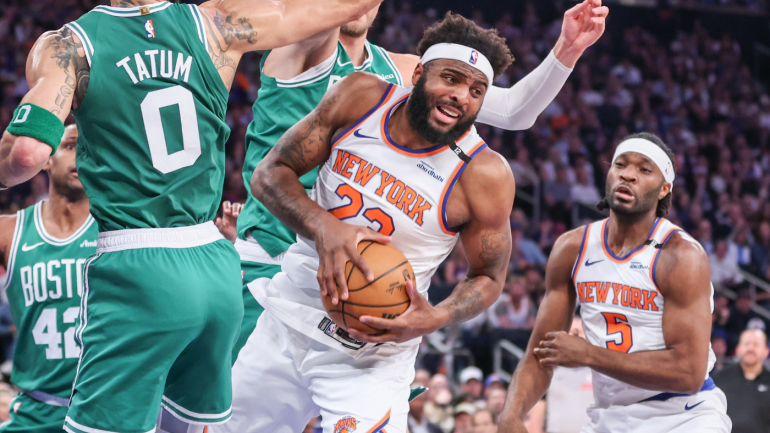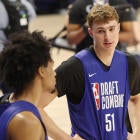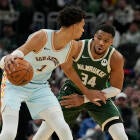
The New York Knicks are winning their second-round series against the Boston Celtics on the scoreboard and nowhere else. Through three games, the Celtics have outscored the Knicks by 18 points. Of the 149 minutes of game play between these two teams, the Celtics have led for 128 minutes and 18 seconds. Yet the Knicks still lead the series, 2-1. Despite their Game 3 loss, they can still win this series just by protecting their home court in Games 4 and 6.
Even if it was primarily shooting variance driving those two Knicks wins, they still count. They just probably aren't reliable measures of performance. The Knicks are getting outplayed in this series. Boston generates significantly better shots almost every time down the floor. Just because the Knicks are technically leading this series does not necessarily mean that they should be acting like a team leading this series. They need to act like a team that is getting outplayed.
If it takes the Celtics shooting 25% on 3s for the Knicks to eke out single-possession victories then the Knicks only have three immediately visible paths to victory. The first is to hope the Celtics go back to making just 25% of their 3s. As Game 3 showed, that's not likely. The second is to hope that they benefit from extremely fortuitous variance on their own 3s. Again, unlikely. The Knicks ranked 28th in the NBA in 3-point attempt rate this season, and the Celtics have limited them to just 31 3-point attempts per game in this series. Even if they make half of their 3s in a given game, they aren't getting enough of them up to assume that would carry them across the finish line. The third, and the one most in their control, would be to make a substantial adjustment of some kind. The obvious place to look is the starting lineup.
No team relies on its starting lineup more than the Knicks do. The five-man unit of Jalen Brunson, Josh Hart, Mikal Bridges, OG Anunoby and Karl-Anthony Towns played 940 regular-season minutes this season. Only two other lineups in all of basketball, Minnesota's original starting five (714 minutes) and Detroit's eventual starting five (491 minutes) reached even half of that figure during the season. They once again lead the playoffs with 212 total minutes. Denver's starters have played 199 minutes, but with an extra game. No other unit is above 129 minutes this postseason. The Knicks are built to ride the starting lineups until the wheels come off.
If this were a traditional 2-1 series in which the leading team had meaningfully outplayed the trailing team, such a group would never think to make a change. Obviously, that hasn't been the case in this series, and that's especially true when the starters are playing. In 68 minutes, New York's starting five has been outscored by 29 points. That's almost exactly what happened in the regular season, when that unit also played three games against Boston and was outscored by 26 points in 65 minutes. We now have a reasonable sample size here suggesting that Boston's starters are going to roast New York's. The fourth-quarter comebacks that gave the Knicks those two wins in Boston were only necessary because of the huge leads the starters gave up beforehand.
The Knicks aren't going to abandon this lineup entirely, of course. Put all else aside and these are still New York's five best players. The Knicks are not an especially deep team. They are still going to win or lose this series largely based on the performance of these five players. It's just worth considering if there is a better way to deploy them.
Enter Mitchell Robinson. He is currently one of only two rotation Knicks with a positive point-differential in this series. The Knicks are +2 with Deuce McBride on the court... and +29 with Robinson out there. All five starters were at least -16 on Saturday. Robinson was -3. On-off numbers can be somewhat circumstantial. Robinson coming off of the bench means that he also plays mostly against Boston's bench, at the very least. He'd lose that advantage as a starter. Almost any change here is more about when he plays than how much. Physically, coming off of the ankle injury that cost him most of his season, he probably can't play more than 20 or so effective minutes per night. Even so, starting him over Hart would address a few significant problems for New York.
The first relates to Robinson's major weakness: his free-throw shooting. He is now 7-of-23 at the line for this series, often because of intentional fouls. Inserting him into the game in the middle of a quarter plays right into Boston's hands because it minimizes the damage of putting the Knicks in the bonus to get Robinson to the line. If his minutes come at the beginning of a quarter, the cost of intentionally fouling goes up. No defense is going to willingly hack Robinson four or five times in a quarter's opening minutes, because then the Knicks could just take him out of the game and play out the frame in the bonus. Even if Robinson's actual playing time doesn't change, the goal should be for as many of his minutes as possible to come at the beginning of quarters or in the last two minutes, when hacking isn't viable because it also grants possession. Starting Robinson instead of bringing him off of the bench facilitates this approach.
Where are the starters struggling? Primarily, it's been on offense, not defense. The Knicks are scoring only 90.4 points per 100 possessions with the starters on the floor in this series. Some of that is some poor shooting variance of their own, but a lot of it is the spacing limitations that come with relying on Hart against an elite defense. He just doesn't get guarded away from the basket. The Knicks averaged 52.5 points in the paint in the regular season. They're down to 42 in this series.
Robinson obviously doesn't address spacing. He takes the Knicks in the other direction. During the 2022-23 season, the Knicks ranked 11th in half-court points per play, but second in half-court points per possession, according to Cleaning the Glass. It was a similar story last season, when the Knicks ranked 16th in half-court points per play but seventh in half-court points per possession. When Robinson is prominently involved, the Knicks get so many offensive rebounds that they can stomach some poor shooting. They win the possession game when he is on the floor.
Think of Houston trying to brute force its way to points over Golden State as this season's most prominent example of competing this way. You can make up for a lot of offensive shortcomings if you just don't give the ball away. It's only a 65-minute sample, but when Towns and Robinson have played together this postseason, the Knicks have an offensive rebounding rate of 38%. The Rockets led the league this regular season at 36.3%. Hart is obviously a great positional offensive rebounder in his own right, but there is a difference between a wing flying in out of nowhere and grabbing the ball every now and then and a big man who can control the entire paint and affect a way a defense positions everyone in response. There's a reason the Celtics have been so eager to foul Robinson off of the floor.
Some of that is rebounding. Some of it is defense. For all of the 3-point shooting variance at play in this series, a lot of what won the Knicks Games 1 and 2 were the 2-pointers Boston missed with Robinson on the floor. With Robinson in the game, the Celtics are 22-of-53 on 2-pointers (41.5%). With him on the bench? They're 41-of-81 (50.6%).
There are obvious risks associated with a change like this. Putting two big men on the floor against a team as good at creating 3s as Boston could very easily backfire. As the Celtics showed in Game 3, they're perfectly willing to foul Robinson as soon as he pulls in an offensive rebound, so he'd have to be cautious in deciding when to go back up and when to go for putbacks. Even if the starting lineup isn't working, the bench is. Removing Robinson from the equation threatens that success. There's ultimately no difference between losing a game with your starters and losing them with your bench. As the Celtics can attest after Game 1 and 2, all the matters is the scoreboard when the clock hits double zeroes.
But the things the Knicks relied on to get those first two victories just can't be relied upon to get them their next two. In the aggregate, the Celtics are dominating the Knicks. They dominated the Knicks in the regular season as well. If the Knicks don't act like they're playing a team that's dominating them, they're going to continue getting dominated. The definition of insanity is doing the same thing over and over and expecting different results. If the Knicks want different results in the majority of these games, it's going to mean making a significant change of some sort. Robinson, as one of the few consistent bright spots in this series, should be at the center of whatever adjustments they make.
![[object Object] Logo](https://sportshub.cbsistatic.com/i/2020/04/22/e9ceb731-8b3f-4c60-98fe-090ab66a2997/screen-shot-2020-04-22-at-11-04-56-am.png)



















